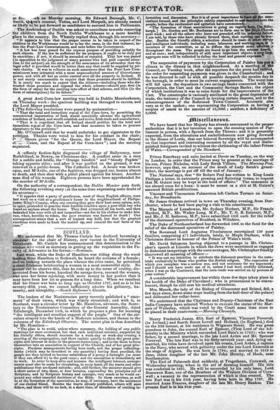SCOTLAND.
We understand that Mr. Thomas Carlyle has declined becoming a candidat^ for the chair of History, now vacant in the University of Edinburgh. Mr. Carlyle has communicated this determination to the student 1‘ acted as secretary in getting up the requisition to the Fa- culty of Advocates in his favour.—Scotsman.
Last week, while the Duke of Hamilton was riding along the wood leading from Hamilton to Bothwell, he heard the screams of a female; and on looking towards the place whence the cries came, he perceived a stout Irishman belabouring a woman in a most unmerciful style. No sooner did he observe this, than he rode up to the scene of cruelty, dis- mounted from his horse, knocked the savage down, rescued the woman, and sent her home rejoicing, with more money in her pocket than it may have been her lot to possess for a long time. When we recollect that his Grace was born so long ago as October 1767, and so is in his seventy-fifth year, we cannot sufficiently admire his gallantry, hu- manity, and intrepidity.—Scotch Reformer's Gazette.
The leaders of the Nonintrnsion party recently published a" state- ment" of their views, which was widely circulated ; and with it, in Scotland, went a circular letter by Mr. Hamilton, advocate, the Secre- tary to the Nonintrusion Committee of the General Assembly, dated Edinburgh, December 14th, in which he proposes a plan for securing " the intelligent and steadfast support of the people." One of the cir- culars strayed into the hands of a Moderate minister, and thence to the columns of the Edinburgh Observer. The secret plan is thus described by Mr. Hamilton— "The plan is to avoid, unless where necessary, the holding of any public meetings for mere excitement, but that each individual minister, supported by his friendly elders, should summon for a week-day or week-day evening a meeting of the congregation, and there explain quietly to them the great prin- ciples and interest at stake in the present controversy ; and invite them to form themselves into an association in support of the Church, and of her great prin- ciples. Previous arrangements having been made, and the proper collecting- books (which may be furnished in any quantity) having been provided, the people are then invited to become subscribers of a penny a fortnight (or more if they can afford it) to the good cause; and the association is immediately set to work. In order to keep alive and increase the intelligent interest, arrange- ments must also be made for circulating, to every hand, all the tracts and other publications that are found suitable; and, still further, the minister should give a short series of two, three, or four lectures, expounding the principles out of Scripture, and by Scripture history and example, very much as he would ex- pound any other essential doctrines of the Bible. In these exercises, as well as at the formation of the association, he may, if necessary, have the assistance of one clerical friend. Besides the tracts already published, others will soon follow, and there will be no lack, in a short time, of abundance of exciting in- formation and discussion. But it is of great importance to have all the asso- ciations formed, and the principles calmly expounded to and instilled into the people, before the excitement and agitation have commenced. "The formation of those associations is going on rapidly here, [in Elm- burgh.] Dr. Gordon and Mr. Buchanan are to form one in the high Church next week ; and all the others who have not preceded will im*.iediately follow. I am told, by those who have already formed them, that nothing can be Sim- pler. Besides the friendly elders, a selection should be made of other ste-sly and intelligent individuals, including some labourers and working-men, itt members of the committee, so as to diffuse the interest more effectua.ly throughout the mass. The people are found to go into the scheme hearti, - and at once; and, independently of still more important objects, a very limy, aggregate sum will be collected to defray the local and general expenses."
The suspension of payments by the Corporation of Paisley has put a climax to the dismay in that neighbourhood. At a meeting of the Council, on Tuesday week, after the reporters for the press had retired, the order for suspending payments was given to the Chamberlain ; and he was directed to call in with all possible despatch the monies due to the borough, in order to meet its current engagements. The worst loss will fall upon the depositors in two savings banks connected with the Corporation, the Cart and the Community Savings Banks; the object of which institutions it was to raise funds for the improvement of the Cart. The catastrophe is variously attributed to the great depression of trade, the leniency of the Council in levying certain imposts, and to the mismanagement of the Reformed Town-CounciL Accounts also vary as to the upshot ; one representing the Corporation as having a surplus of assets to the amount of 16,000!.; another, a deficiency of 8,0001.































 Previous page
Previous page